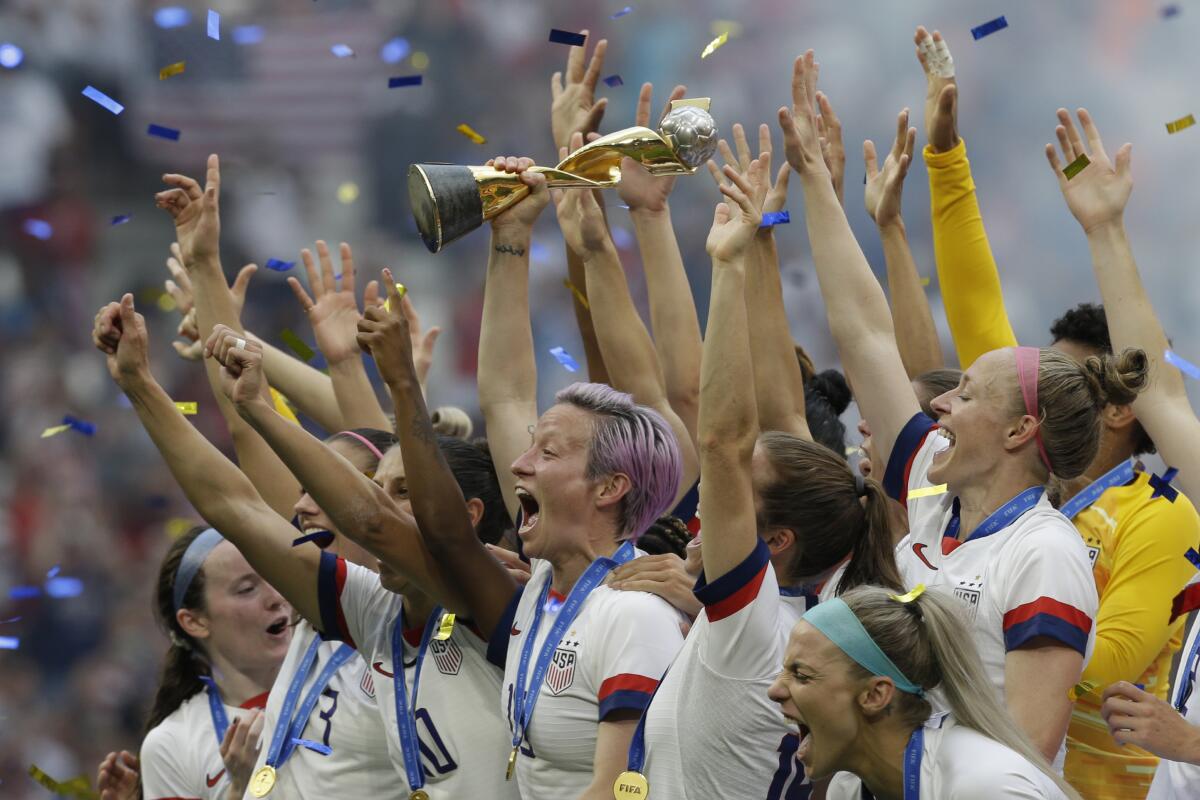Column: Victoria’s Secret has a new sheen of female empowerment. It’s not working

- Share via
Picture a fleet of merchant ships far out on the glistening Pacific, each one carrying about 600,000 tons of freight.
The cargo is curious: candy-colored strips, strings and scraps composed mostly of synthetic polymers from factories — some say sweatshops in places such as Sri Lanka and Jordan. It’s all dignified with the posh word “lingerie,” which is French for “linen,” though linen is almost nowhere to be found in the heaps upon heaps of petroleum-based morsels.
And then, oh boy. This cargo of strips and strings gets further transformed, by the Ohio-based branding juggernaut known as Victoria’s Secret.
Right this minute, in fact, a few tablespoons of pink petroleum-based fabric and cord can be purchased for $12 in the form of the Dream Angels V-string Panty in neon peony.
But while a thong like this — a piece of excruciatingly abrasive and eventually filthy twine that passes through the buttocks and barely covers the genitals — is still on offer at Victoria’s Secret, other things at the brand are changing. Sort of.
On Wednesday, the company unveiled a new pseudo-feminist campaign designed to revive the ailing brand, to update its soft-porn aesthetic and perhaps its high-profile ties to the prolific sex offender Jeffrey Epstein.
“We needed to stop being about what men want,“ Martin Waters, who was appointed chief executive of the brand in February, told the New York Times, “and to be about what women want.”
The first sign of the new Victoria’s Secret is a set of seven grayscale headshots of high-achieving women appearing at the top of the brand’s homepage.
This so-called VS Collective — “an unparalleled group of trailblazing partners” — is a far cry from previous Victoria’s Secret banner carriers, the barely clad Angels, who used to stomp around in lingerie and weird bedazzled wings. (They’ve been retired.) But the VS Collective is still composed mostly of models, though several are nonwhite, one is plus-sized and two are over age 30.
They include Adut Akech, the South Sudanese-Australian refugee supermodel; Valentina Sampaio, the Brazilian trans model; Paloma Elsesser, the biracial plus-sized model; Priyanka Chopra Jonas, the Indian actor and former Miss World; and Megan Rapinoe, the U.S. soccer superstar.
I wanted to give this impressive group a chance to redeem the tacky misogyny of Victoria’s Secret, so I kept scrolling.
Just below VS Collective photos, Elsesser models a line touted as Everyday Comfort. Promising enough. The undergarments even look comfortable, if you don’t mind lace or substantial padding.
It was also heartening to see that they were made of “iconic heritage fabrics.” Linen leapt to mind, but alas, Victoria’s Secret’s ideas of heritage materials are polyamide, elastane, polyester and a dash of “other fiber.”
It went downhill from there. In spite of the social-justice window dressing of the new campaign, the company has clearly not abandoned its commitment to commodifying, constraining and infantilizing female bodies.
Push-up bras that mash and contort. Bondage corsets that gouge the ribs. Animal-printed garters with rhinestones that — do what, exactly? And a Very Sexy Pleated Babydoll in rose begonia.
The VS Collective hoopla seems to delight exactly no one. Right-wing podcaster Jesse Kelly griped about the rebrand on Twitter: “Nobody likes feminists. Nobody.”
That was countered with a lot of people pointing out that nobody likes Jesse Kelly, nobody, but feminists were not jumping to endorse the rebrand either. Mia Mercado noted in New York magazine that Victoria’s Secret has for ages pretended to “empower” women while barely concealing its transphobia, fatphobia, age discrimination, racism and misogyny.
Victoria’s Secret was built by billionaire Leslie Wexner, a lifer in what used to be known as the rags trade. He bought the brand in 1982 for $1 million from its founder, Roy Raymond, who opened the first shop in a Palo Alto open-air mall in 1977. It was originally themed as a discreet Victorian boudoir, where men could buy lingerie for women without embarrassment.
Wexner, however, was having none of Raymond’s discreet-boudoir vibe. He phased in the unmistakable mall style Victoria’s Secret is known for — a look that’s less Victoriana and more cam girl.
As of last month, Wexner was officially off the board of the parent company, disgraced by his close friendship with Epstein. All but one person on the new board are women. And the choice to rebrand with the likes of soccer hero Rapinoe is without a doubt a headline grabber.
If someone like Rapinoe is partnering with Victoria’s Secret, who are regular shoppers to reject it as passe or anti-progressive?
Well, maybe regular shoppers who actually buy underwear. Over the last decade, after all, a proliferation of start-ups including Knix, Lively and MeUndies have featured normal, affordable undergarments. They indulge in marketing, but chiefly on the specifics of the products, not Bond-girl bodies. MeUndies, for example, is co-ed, and the underwear, much of it in sustainable modal, is made in America.
Also, erotica isn’t the point. Presumably some women (and men) will still go to Victoria’s Secret for candy-colored strips, strings and scraps. But if the company thinks the sheen of female empowerment is going to get sensible women of 2021 into a Love by Victoria Logo Hardware V-string Panty in nougat leopard, I’m gonna bet they’re wrong.
More to Read
A cure for the common opinion
Get thought-provoking perspectives with our weekly newsletter.
You may occasionally receive promotional content from the Los Angeles Times.










